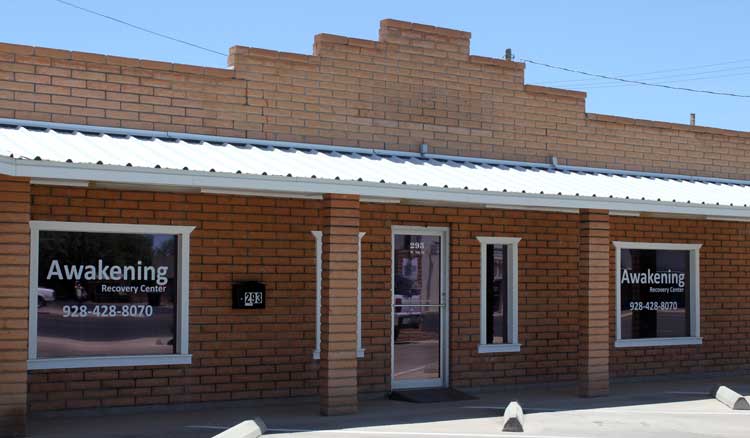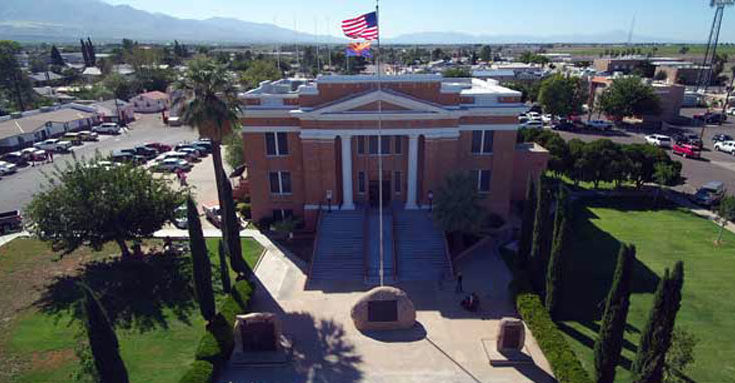Jon Johnson File Photo/Gila Herald: The Graham County adult drug court has been in action since March 2017.
“The drug court is effectively the closest thing to a rehab we’re ever going to have here in Graham County in all probability.”
Graham County Superior Court Judge Michael D. Peterson
By Jon Johnson
SAFFORD – A cadre of professionals involved with the court system gather each Monday afternoon to meet and discuss how the participants of Graham County’s adult drug court are or are not progressing. It is here where positive incentives for progress are given and punishments for regression are dealt to those in the program.
The formation of the adult drug court was due to the desire of Graham County Superior Court Judge Michael D. Peterson, who wanted to create a program to assist drug and alcohol abusers break the bonds of their addictions, especially those who have a high risk of falling back into a pattern of alcohol and drug use after becoming clean.
“We would not be able to do any of this without Judge Peterson,” Graham County Probation Officer Michael Kenehan said. “He came in (to office) and he wanted to do this type of program. He pushed it; he made it happen. The three to five minutes the participants spend with him on a weekly basis – from my observation – is the most important part of the program. They have bought into the program because of his energy to it and his dedication.”
The program aims to not only produce contributing members of society but also lower the crime and recidivism rates. According to Judge Peterson, 98 percent of all crime he deals with in his courtroom is related to drug or alcohol abuse in some way.
“Many of those crimes wouldn’t happen if the person didn’t suffer from addiction,” Kenehan said. “Our fundamental focus day one is to get them clean. If they need detox or if they need in-patient treatment, we make those things happen. We keep track of clean days not only for celebration purposes but those clean days usually equal no new crime days. So, we do feel that we’re reducing recidivism significantly.”
The program began in March 2017 and can take up to two years to complete. Currently, there are about 20 members in the program, which has produced five graduates to date, with two more possibly graduating this week and three more by the end of the year.
“If you can graduate drug court, you can do anything,” Judge Peterson said.
“They’re not bad people. Nobody who I have dealt with in drug court has been a bad person. They have all been good people. They’re like you and me. They are no different. They’re not morally bad people, but they have made decisions that have caused them to do things that are against the law and we have to hold them accountable.”
The administrators of the drug court group are made up of Judge Peterson, defense attorney Rebecca Johnson, Graham County Deputy County Attorney Chase McCormies, and Josh Halverson and Michael Kenehan from the Graham County Adult Probation Department. The group also works in association with Awakening Recovery Center and Community Medical Services, which utilize abstinence-based therapies and medication-assisted treatments (MAT), respectively, Community Partners Integrated Healthcare, and Southeastern Arizona Behavioral Services. Part of the program includes mandatory one-hour therapy sessions three times per week with some sort of provider.
“Our collaboration with those agencies is fundamentally another reason why this program works,” Kenehan said.
“I’ve been doing probation (for) almost 20 years and I’ve never had this level of support from just about any agency in this community that is trying to help people with substance abuse issues.”
“The drug court is effectively the closest thing to a rehab we’re ever going to have here in Graham County in all probability,” Judge Peterson said. “The people in drug court have a very highly regimented week. They are required to attend three or more counseling sessions; they will drug test anywhere from one to five times – typically about three on average – so, the reason people are finding success is the accountability . . . The most compassionate thing I can do is hold you accountable. That may be very unpleasant on the those receiving that accountability, but it’s the most compassionate thing I can do because it helps you understand that you have to make different choices and if not then there is a consequence.”
While opiate use has increased, the most-abused drug of choice in Graham County continues to be methamphetamine, which does not have a MAT.

With the drug court regimen, participants also can be jailed for short periods for a variety of reasons, including failing a drug test. Judge Peterson recalled running into a drug court participant the day the participant got out of a 16-day jail stint ordered by the judge and said the man thanked him for the incarceration because he needed it to get clean.
“A lot of people who we deal with won’t stop until there’s some form of consequence that’s severe enough that it becomes intelligent for them to make a different choice,” Judge Peterson said.
Both Judge Peterson and Kenehan reported that the program has likely saved lives of people who otherwise would have succumbed to their addictions and that they measure the success rate by how much the participants buy into the program, the various participants reporting their number of days sober, and the fact that they haven’t had to revoke anyone in the past six months and only one in the past year.
“There’s a lot of camaraderie between the participants,” Kenehan said. “They feel like the program is designed to help them . . .”

“If someone comes in and they say ‘I’ve been clean one day’ we still clap for one day,” Judge Peterson said. “Everyday means something. You’re clean one day out means something. We’re not thrilled that you used yesterday, but you’re clean today. We can’t change yesterday, but we can change today.”
That being said, program administrators also ask that family members and employers also help the program’s participants be successful by allowing them the time to work on their rehabilitation by going to meetings and following through with the other aspects of the program.
“It’s investing in these people’s and the community’s future by helping them get long-term sobriety,” Halverson said.
Kenehan said the best way to protect the community is to help them with their underlying problems.
“I know for a fact that we have saved lives with this program,” Kenehan said. “I know two individuals off the top of my head that without this program would not be doing MAT services, would not be participating in counseling and, if they weren’t sitting in jail waiting to go to prison, they would have overdosed by now. That has given me more meaning than anything else I have ever done with probation and I supervised sex offenders for seven years to protect this community. This gig is doing way more for the community than I’ve ever done before.”







